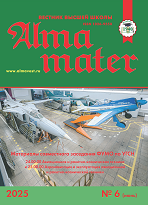UDC 7.9-042.4:811:004
https://doi.org/10.20339/AM.12-20.098
E.A. Monastyrskaya is Cand.Sci. (Philology), Ass. Prof.; O.V. Mityakina is Ass. Prof; and M.A. Silkova is Senior Lecturer. All authors at Kemerovo State University e-mail: alina00marina@yandex.ru
Shown is experience of using Internet resources in training students in foreign language. The relevance of using information environment in teaching foreign languages is due to forced distance learning. To activate the cognitive interest and develop communicative abilities of students in non-linguistic areas, advisable is to use project methods. Mandatory condition is the appeal of participants in educational environment to social networks, they enable online communication with native speakers. The E-mail project is considered as a means of implementing linguo-culturological approach in teaching a foreign language. The article describes two methodological tasks of project activity in the aspect of cross-disciplinary connections. The authors note the effectiveness of using the electronic information environment for training students in English.
Key words: digitalization of education, e-learning, internet technologies, university, cross-disciplinary connections.
References
1. Bezpalova, A.G., Mirgorodskaya, O.N., Dadayan, N.A., Legkonogikh, A.N. Digital communication is a dominant of the educational process at a regional university. Modern higher technologies. 2019. No. 9. P. 122–125.
2. Bogacheva, N.V., Voiskounsky, A.E. Computer games and creativity: the positive aspects and negative trends. URL: https://elibrary.ru/item.asp?id=32677087 (accessed on 10.09.2020).
3. Polat, E.S., Bukharkina, M.Yu., Moiseeva, M.V., Petrov A.E. New pedagogical and information technologies in the education system. URL: https://www.studmed.ru/view/polat-es-novye-pedagogicheskie-i-informacionnye-tehnologii-v-sisteme-obrazovaniya_2acf2a8d0c8.html (accessed on 10.09.2020).
4. Fenwick, T., Edwards, R. Exploring the impact of digital technologies on professional responsibilities and education. URL: https://elibrary.ru/item.asp?id=32065382 (accessed on 20.08.2020).
5. Gupta, N., Irwin, J. In-class distractions: The role of Facebook and the primary learning task. URL: https://www.scopus.com/record/display.uri?eid=2-s2.0-4919467785&origin=inward&txGid (accessed on 10.09.2020).
6. Kostyuchenko, M.V., Trutnev, A.Yu. Internet Resources in English Learning. International Journal of Applied and Fundamental Research. 2018. No. 1. P. 181–185.
7. Malykhin, O.V., Karpiuk, V.A. Methodical Techniques of using ICT in the Process of Forming the Students-Philologists' Linguistic and Country Study Competency. Information Technologies and Learning Tool. 2018. No. 6. P. 112–124.
8. Vitorovitch, M.R. Learning to listen in the classroom using online resources. In: Intercultural communication and mass media. Barnaul, 2020. P. 13–15.
9. Enygin, D.V., Maslova, E.G., Zarudnaya, M.V., Goncharova, I.D. The use of Instagram in training for speaking and writing in a foreign language. RSUH/RGGU Bulletin. 2019. No. 3. P. 70–78.
10. Boshtchenko, I.A. Online resources in distance learning of foreign languages. In: Intercultural communication and mass media. Barnaul, 2020. P. 6–10.
11. Zhdanova, G.A., Almyashova, L.V. Foreign Language: Modern Linguistic Research and Language Learning. Izvestiya of Tula State University. 2015. No. 3. P. 25–29.
12. Almyashova, L.V., Lasareva, T.M., Kasakova, I.M. Teaching foreign languages: linguistic and cultural aspects. URL: https://moluch.ru/archive/124/34200/ (accessed on 10.09.2020).
13. Almyashova, L.V., Ovcheruk, L.D. Formation of Linguistic and Cultural Competences of Students in Non-linguistic higher Education Institutions. Bulletin of Omsk State Pedagogical University. 2015. No. 1 (5). P. 92–94.











.png)






